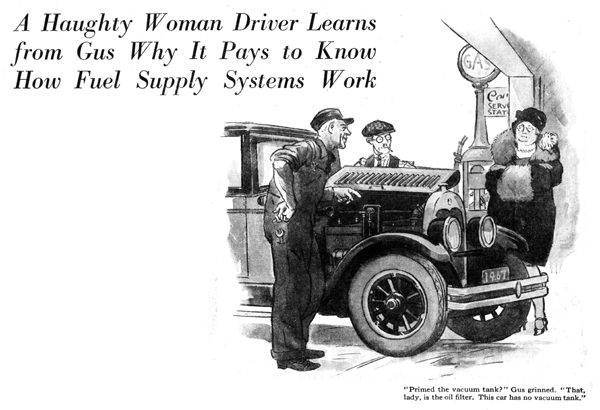February 1929
WHAT FEEDS GAS TO YOUR CAR?
by Martin Bunn

"You the mechanic here, my man?"
A harsh feminine voice rattled Gus Wilson's eardrums and brought his head around with a jerk.
"Yes'm," he mildly replied to the bossy female whose car had coasted up behind the veteran auto mechanic.
"Well," she snapped. "I hope you're not as dumb as most auto mechanics. I know something about cars myself and I don't intend to be swindled. Can you fix this car or can't you?"
"What seems to be the matter?" Gus inquired, still mildly.
"It's your job to find that out," she replied pointedly.
Joe Clark, Gus Wilson's partner in the Model Garage, had strolled over to watch and the older man slyly winked at him as without further remarks, he raised the hood of the car.
"Now don't try to tell me it's the vacuum tank," she warned Gus. "I took off the pipe and primed it with gasoline several times and that isn't the trouble."
"Primed the vacuum tank?" questioned Gus puzzled.
"That's what I said," she snapped.
"I took off that pipe right there." And she pointed to a round metal tank fastened to the side of the engine.
"I don't wonder that didn't do much good," Gus observed with a grin. "That tank, lady, is the oil filter. This car hasn't got any vacuum tank."
"What!" she gasped, and her domineering attitude went down like a flat tire. "No vacuum tank? Why, the course I studied said that all cars had vacuum tanks."
"Not quite all," grinned Gus. "In Ford cars, both the old lizzies and the new ones, they stick the supply tank up high enough so the 'gas'll run downhill into the carburetor. It's called the gravity system. But there's at least three other ways of doing the job. Air pressure is one of 'em. Then there's a dinky little magnetic pump that draws juice from the battery to work it. And this boat and several other breeds use a new kind of mechanical pump."
"Why so many different systems?" the woman inquired interestedly. "I should think only one could be the best, so why use the others?"
Differences of opinion is what makes horse traders, ma'am," Gus replied. "Each system has its good points and its bad. It looked for a while as though the vacuum tank would win out. Nearly all cars had 'em. But better roads and faster driving brought out a bad feature. When you're sailing up a long, steep mountain road, or burning up the road on the level, the vacuum tank falls down on the job. It depends on the vacuum in the manifold to work, and when the throttle is nearly wide open there isn't any vacuum.
"The pressure system gets around that trouble, but it costs more to install, and there's always a chance for a leak in the pressure lines. The gravity system, though, can't go wrong unless somebody repeals the law of gravity!"
"If it's so perfect, why doesn't every car have it?" the woman inquired.
"Some designers," explained Gus, "don't like the idea of putting the gas tank in the cowl back of the dash, and that's about the only place in a modern car where it will be high enough to feed right on the hills. It works out all right in light cars with small gasoline tanks, but a big car needs a larger tank that takes lots of room, and when it's full there's a lot of weight up in the air instead of down near the road where it ought to be."
"What's the matter with the other two systems you mentioned?" she asked.
"Well," Gus replied, "the electric pump goes dead if something happens to the electric wiring and the new mechanical pumps haven't been on the market long enough to be sure about what they do after years of service."
"Which system would you rather have on your own car?" the woman inquired.
"Any one of 'em," said Gus, "so long as it was installed right and put where it could be repaired easily."
"Bet you'd want to be able to recognize it, wouldn't you?" she smiled.
"That is kind of necessary," admitted Gus. "And there's another thing about automobiles you ought to know. Don't jump at conclusions. You made up your mind that something was wrong with the gasoline feed and you were bound you'd find that kind of trouble."
"What is wrong, anyhow?"
"Oh, I fixed that while we were talking," Gus grinned. "The high tension wire had snapped off at the coil. Now I'll drain the crank case to get rid of the gasoline you poured into the oil filter, and put in fresh oil."
She cordially thanked Gus and drove off. Joe then spoke up.
"Good work, Gus. Know who that was? That's Hank Preeble's widow. He left her a big trucking business over in Tupperville. She's got a lot of repair work she could throw our way. It sure pays to treat 'em right."
"Sometimes it's a tough job, though," grunted Gus. "I certainly wanted to tell that dame to go jump in the lake!"
END
L. Osbone 2019